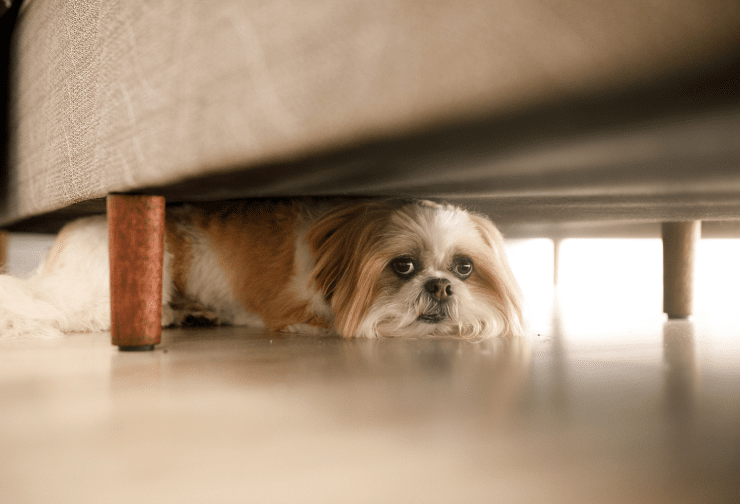Table of Contents

Plants toxic to pets
Pet-friendly plants
Did somebody say 'a garden you can eat'?

Table of Contents

Plants toxic to pets
Pet-friendly plants
Did somebody say 'a garden you can eat'?
As it gets a bit warmer and your pet wants to spend more time outside, it is the purrfect time to make sure your garden is safe for your furry friend. Whether you're a dog person, cat person, or a bit of both, it’s really important to know what plants are toxic to pets!

Sometimes the pretty bright colours are too much for your pet to resist and they might decide to eat a plant. If the plant is toxic, then your pooch is likely to experience symptoms such as vomiting and diarrheoa. Most plants are only toxic to pets if they are eaten, but it is important to note Lillies are exempt from this and even just their pollen can cause irritation if brushed onto your pet’s fur. Unfortunately some plants are more toxic than others as well, the most common plants that can cause serious issues (and possibly fatalities) are Foxgloves and Lillies.
So it seems, plants that are toxic to pets can be a complicated subject, but don’t worry we’ll try and keep it simple.
Dogs and cats do react differently, and some plants are more likely to affect certain pets. For instance, cats are more attracted to Foxgloves meaning they are just more at risk of being poisoned by this plant. Also the age of your pet comes into play, the younger your pet is, the more likely they are going to explore with their mouth and let their curiosity get the better of them…
If you see your furball ingest a toxic plant or suspect they have, contact a vet immediately. The quicker the plant is out of their system, the quicker they’ll be back bouncing around.
There are many plants you can opt for to keep your garden safe for your pet. Sunflowers and Roses are a win with pets as well as herbs like Rosemary and Thyme which can add a lovely aroma to your garden. For a sensory boost, you can also get plants with interesting scents that your pet might enjoy, for example cats are a big lover of Valerian plants.

If not plants, you could think about growing fruits and vegetables. Most are safe for pets and can be a fun addition to their diet.
Herbs: Basil, mint, and parsley are not only safe for pets but can also have good health benefits. Catnip, in particular, is a favourite for cats and can be grown easily in a sunny spot.
Vegetables: Carrots, peas, and green beans are great for dogs, while many cats enjoy a nibble of fresh cat grass. Always research and ensure the specific plants you choose are safe, and avoid onions, garlic, and chives, which can be harmful.
Berries: Blueberries and strawberries are generally safe for both dogs and cats and can be a delightful treat. Just be cautious with the quantities and monitor for any allergic reactions.
Always consider using organic alternatives to chemical fertiliser or pet-friendly products. You could try more natural ways like introducing helpful insects such as ladybirds to remove pests from your plants.
Having a pet-safe garden doesn’t come at the click of a button, but a good rule of paw is that ‘when in doubt, chicken out’ and don’t plant it.
Our Vet Team are professionally qualified in veterinary medicines advice and they're here to help. Led by Dr Zoe Costigan, we're no nonsense and knowledgeable experts! Nothing makes us happier than helping you be flea and worm free. We're on the usual socials @itchpet, so slide into our DM's, drop us an email or hop on the phone.
Contact us


Ticks are pesky little creatures that can not only wreak havoc on your pets but also invade your home if given the chance. It’s important to know what attracts ticks to your house, where they hang out in your homes, and most importantly, how to get rid FOR GOOD!

Keeping an eye on your dog’s magic number (the ideal weight for their breed and age) is super important.
If you know your dog’s weight, it's easier to work out things like how much food they should eat, or the amount of flea or worm treatment to give them. Getting the right treatment is the safest and most effective way to prevent your dog getting fleas or worms.

If you’ve ever found yourself nose-to-nose with your pet and nearly keeled over from their breath, you’re not alone. Dental hygiene isn’t just a human concern—it’s just as important for our furry friends. But as much as we’d like to think our pets will sit obediently while we shove a toothbrush in their mouth, that’s not reality. Pet dental treats can do this job for us, but how and is it always the best way to keep your pet dental disease free?